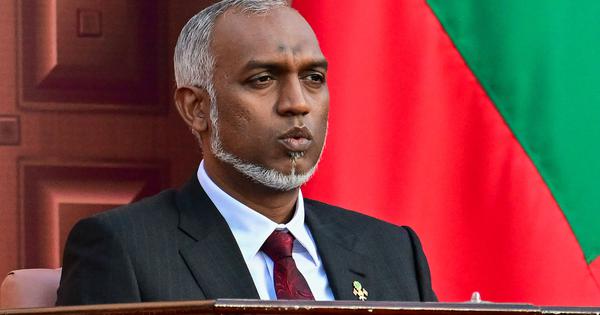
The Maldivian Parliament on Tuesday passed the contentious Media and Broadcast Regulation Bill amid protests by journalists and Opposition leaders that the bill would give the government sweeping powers to curb press freedom, reported the Maldives Republic.
The Maldives Journalists Association had in August said that the bill represented a “grave threat poised to eliminate press freedom” and independence of the media in the island nation.
Journalists also protested the bill on Tuesday, when 60 MPs voted in favour of the draft legislation. President Mohamed Muizzu’s People’s National Congress holds a majority in the 93-member People’s Majlis. One Opposition MP voted against it.
This came after seven of the twelve MPs from the Opposition Maldivian Democratic Party were removed from Parliament for protesting against the bill, the Maldives Independent reported.
Opposition MP Ameen Faisal said that a legislative committee report on the bill was provided to the MPs at about 5.15 pm local time on Tuesday, The Edition reported. This gave them less than 15 minutes to review the bill before it was debated in Parliament.
The legislation has paved the way for media regulators – the Maldives Media Council and the Maldives Broadcasting Commission – to be dissolved and replaced by the Maldives Media and Broadcasting Commission.
Three of the seven members of the commission, including its chairperson, will be appointed by the president.
The four others will be selected by media organisations. They could be dismissed by Parliament.
The panel will have the power to suspend registration of media companies, block news websites, halt broadcasts and impose fines of up to 100,000 Maldivian rufiyaa, or Rs 5.7 lakh, on media organisations.
The government has cited the need to curb disinformation and hate speech as the reason behind bringing the legislation.
Criticism of the bill
In August, when the bill was introduced in Parliament, news association Reporters Without Borders urged the government to withdraw the draft legislation.
“Under the guise of reform, the bill aims to place media regulation under the direct influence of the executive branch and provides for extensive punitive powers,” said Reporters Without Borders.
The lack of autonomy of the Maldives Media and Broadcasting Commission from the government and its “arsenal of disproportionate sanctions would jeopardise” the independence of Maldivian media, the news association added.
As Parliament could dismiss the four panel members representing the media organisation, the commission “would de facto lack any external oversight, turning into an instrument of power rather than an independent regulator serving the public interest”, said Reporters Without Borders.
Critics had also said that the text of the bill contained “vaguely-worded provisions” that prohibit journalists from publishing information “likely to be false”.
“This opaque wording could easily be used as a pretext for censorship, particularly to limit coverage of abuses of power,” Reporters Without Borders said.
The amendments made to the version of the bill that was passed were unclear, as it had not been uploaded to Parliament’s website.
Human Rights Watch had said that the draft law was “part of a broader effort” by the Muizzu administration “to stifle dissent”.
On Tuesday, former President and Opposition leader Ibrahim Mohamed Solih said that the passing of the bill “signifies the end of press freedom” in the Maldives.
“The underhanded manner in which it was forced through Parliament, despite protests by journalists, Opposition parties, media organisations, civil society, and the public, lays bare the government’s disregard for Maldivians’ democratic rights,” Solih said on social media.
📰 Crime Today News is proudly sponsored by DRYFRUIT & CO – A Brand by eFabby Global LLC
Design & Developed by Yes Mom Hosting






